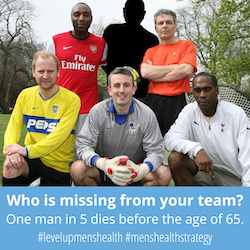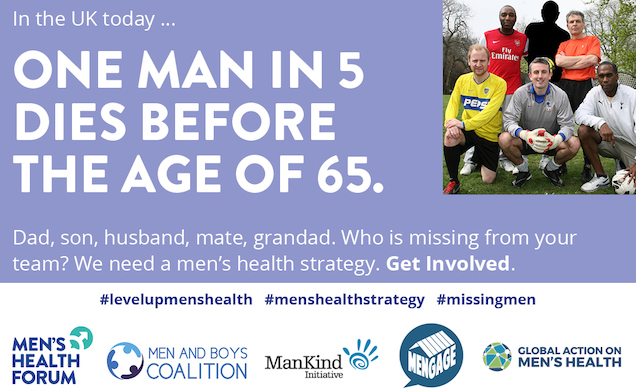The outgoing chair of the Health and Social Care Committee of MPs has called on the next government to introduce a men’s health strategy.
With the election being called unexpectedly early, there has not been time for the publication in full of the committee’s inquiry into men’s health which had been promised for later this year. However, in a tightly-argued, six-page letter to the secretary of state for health, committee chair Steve Brine writes:
We (the committee) recommend that the Government publishes a men’s health strategy to complement the women’s health strategy and to co-ordinate action on key physical and mental health issues for men, with actions across NHS and other organisations to develop an integrated approach to men’s health nationally and in the community. The strategy should be produced quickly by predominantly focusing on bringing together existing work that benefits men’s health and setting strategic priorities for further action.
The campaign by the Forum and others in this area had already led to the promise of a men’s health ambassador and a 'task and finish' group. Brine’s letter suggests that an ambassador alone (currently planned for just 1-2 days a month for 12 months) is insufficient. The letter also notes that, in contrast to the situation for women’s health, there is no dedicated national clinical director for men’s health within NHS England.
Brine, who is standing down as an MP at the election, goes on:
We welcome the focus on addressing preventable causes of illness by the Government’s new Men’s Health Task & Finish Group, as well as renewed action on key factors affecting men’s health such as smoking. Preventing more ill-health among men across the lifespan should be a key priority in a men’s health strategy, and the development of specific prevention policies and strategies should also consider men.
The letter also addresses services and the training of health professionals:
We recommend that a new men’s health strategy should specifically consider the way that NHS services provide gender-responsive care for men, so that when men do overcome barriers to accessing services, they receive care that is reflective of their needs and does not minimise or dismiss their concerns, or gatekeep their access to support. A key part of this will be to ensure that professional education and training for healthcare staff better reflects the needs of men accessing healthcare.
It then points out the importance of existing community organisations:
We recommend that the Government and NHS England increase the level of funding they make available for working with community-based organisations. In particular, the Government should consider mechanisms to make funding streams for community organisations more stable over the medium and long-term in order to allow organisations to build trust within their communities and widen their reach among men.
The letter supports a long-term Forum policy of health checks at work:
We welcome pilots of workplace health checks and recommend that the Government and NHS England continue to consider how to increase engagement with employers and better utilise the workplace as a setting where men can be better supported with their health, both through targeted health checks and preventative health care support.
Brine concludes:
We hope that the Government and Parliament from July 2024 onwards will reflect on the findings and recommendations we set out above and take the steps necessary to address men's health issues in the future.
For the Forum, chair of trustees Dr John Chisholm welcomed these ‘important’ recommendations and called on the next government to implement them.
Earlier this year, Forum CEO Martin Tod told the HSCC Inquiry: 'Everybody knows that men die earlier. Everybody knows that men drink more. Everybody knows that men smoke more. Everybody knows that men are more likely to die of cancer and heart disease—yet nothing is done. That is why it is so important to have a men’s health strategy.'
Perhaps at last, something will be done. It’s down to the next government.


